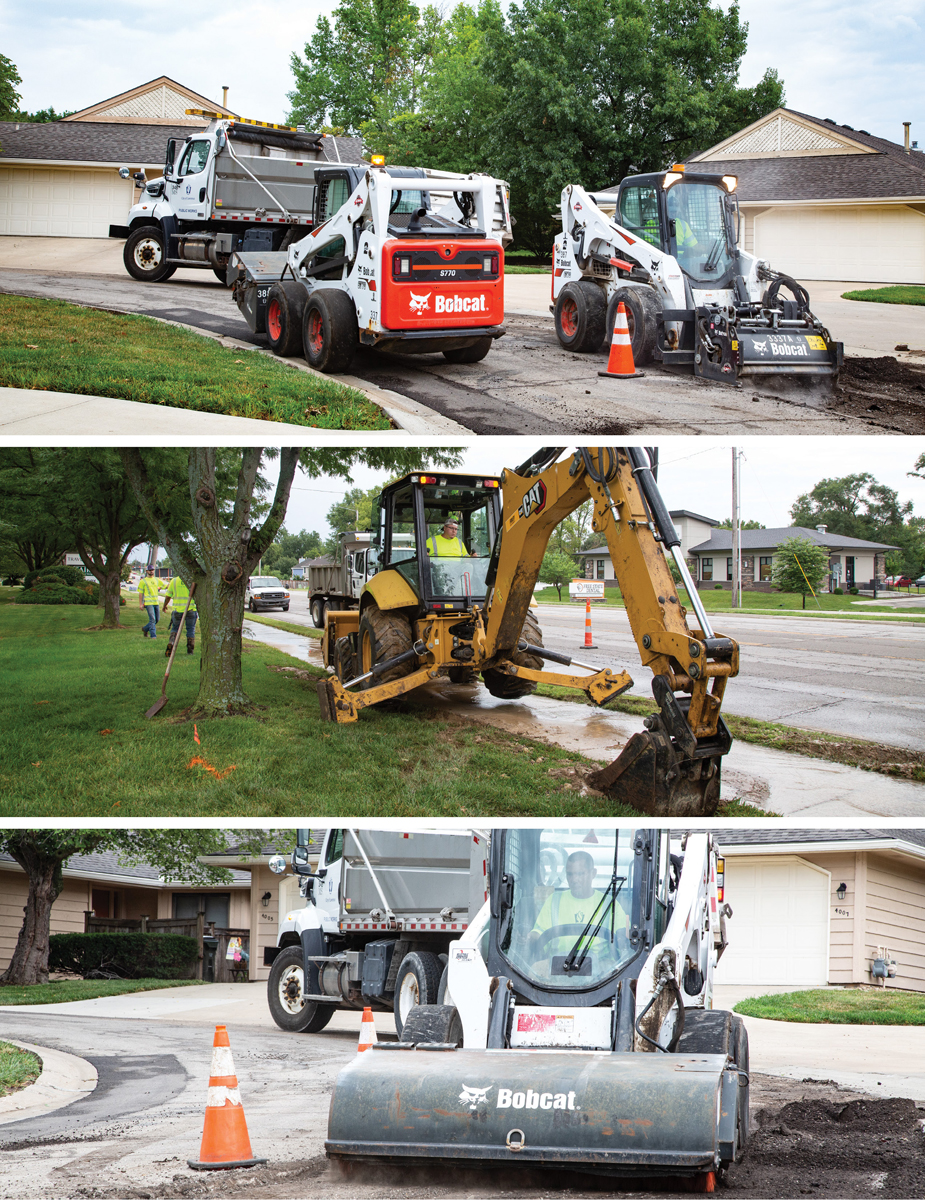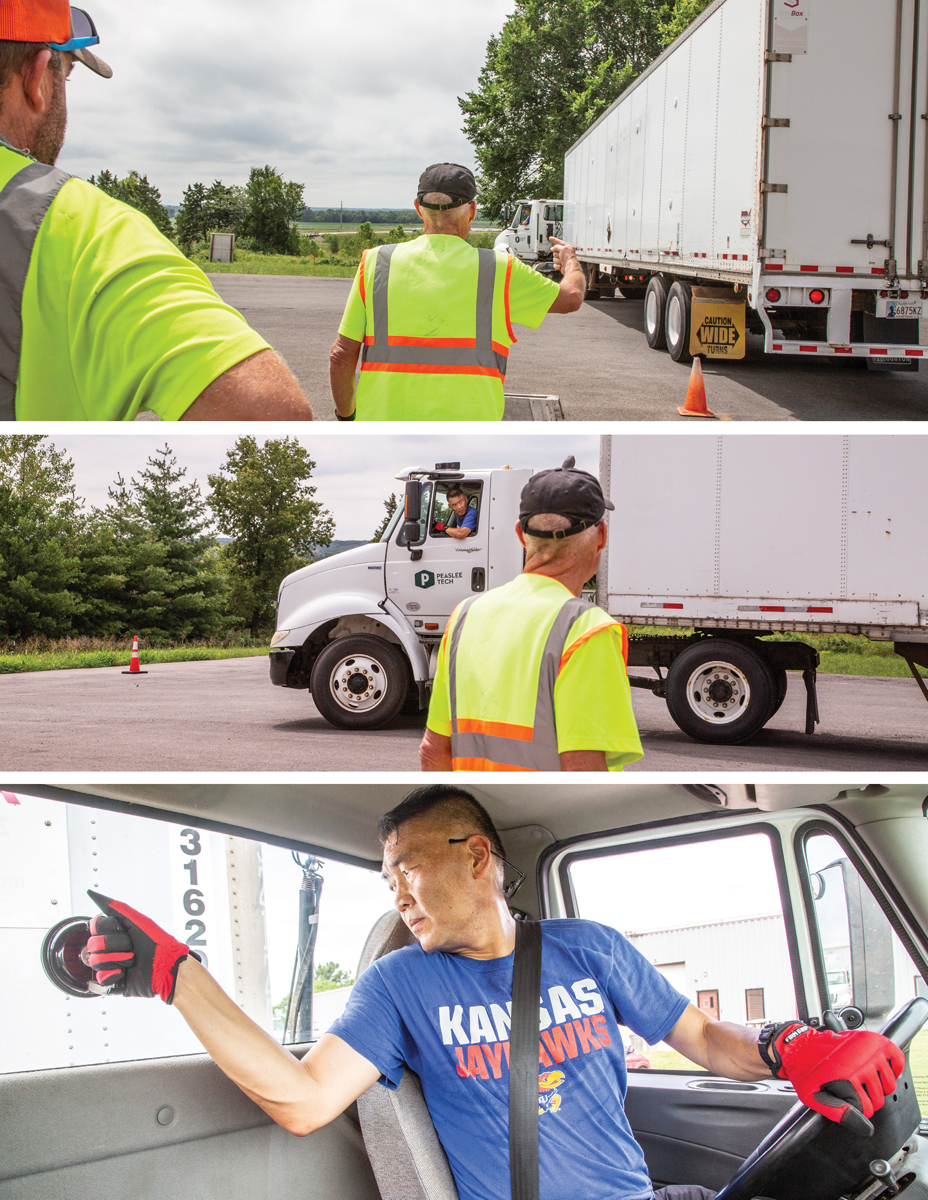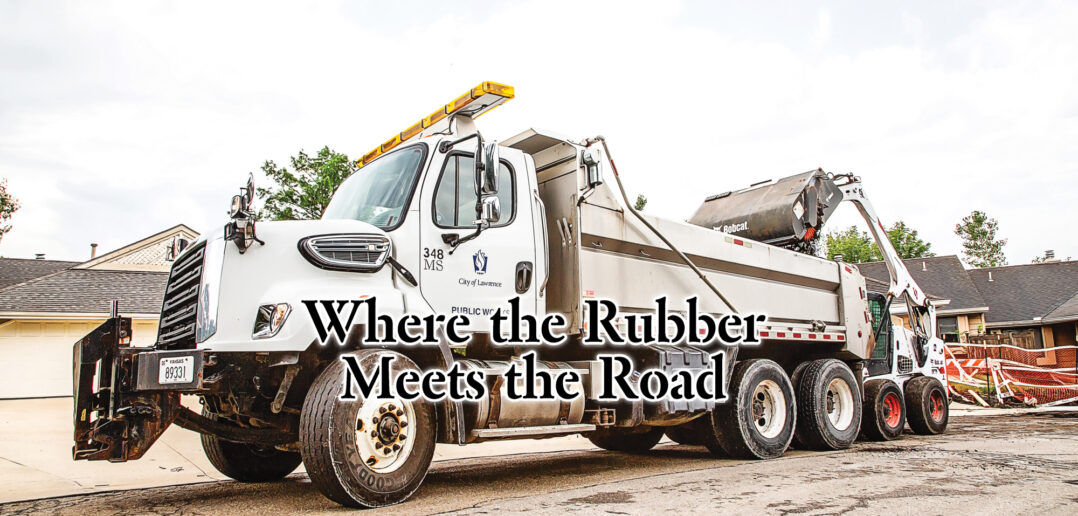| story by | |
| photos by | Steven Hertzog |
| OPEN A PDF OF THE ARTICLE |
Collaboration between organizations that employ commercial truck drivers and local tech center keep the community running efficiently.

Truck and bobcat work together with the City of Lawrence
Douglas County roads carry loads of commercial truck traffic every day. Every single one of those vehicles needs a certified driver at the wheel, so that makes for a lot of local job opportunities that require a commercial driver’s license (CDL).
Standard Beverage Corp. and the City of Lawrence recruit, hire, train and employ dozens of CDL drivers and roll trucks all over the area, day and night. Driving a commercial truck means delivering vital supplies, performing essential jobs and, overall, contributing to improved quality of life for everyone.
Commercial truck driving is the opposite of a desk job—drivers are out and about most of the time and get to know people and places around town. The job requires physical energy and is rewarded with the satisfaction of completing crucial transport for materials and services.
Recent changes to the federal requirements for testing and training for CDLs means that both the City and Standard Beverage have relied heavily on the expertise housed at Peaslee Tech, in Lawrence, to execute and supplement their respective CDL training programs.

Various forms of heavy equipment used by the City of Lawrence
Truck-Related Jobs
It may look like a single vehicle with a driver, but behind and around and all over that vehicle are the efforts of a team—in-house and communitywide.
There are more than 150 positions with the City of Lawrence that require a Class A or B CDL, says Jenny O’Brien, MSO analyst management for the city’s Municipal Services and Operations. Jobs include solid waste operators who drive garbage trucks; water distribution drivers; sanitary sewer collection; streets maintenance crew; traffic maintenance crew; and the garage staff that maintains and repairs all the machines. Many of the jobs have a Monday through Friday work week with varying shifts, but major weather events and other happenings can lead to overnight and weekend work, as well.
Standard Beverage is an alcoholic beverage wholesale distributor across the state of Kansas. The company sells and delivers beer, wine and spirits to licensed customers that include restaurants, liquor stores and bars. About 85 drivers spend either their days or their nights in trucks loaded with cases of beverages, driving routes and unloading their wares at establishments large and small. Daytime drivers deliver the products to stores, while the line-haul drivers take products to bars and restaurants at night, says Carl Wettstein, director of transportation and day operations at Standard Beverage. Drivers work 10-hour shifts, four days or nights per week.

Peaslee Tech teaches and provides commercial driver’s license for men and women
New CDL Rules in 2022
With so many positions to fill and keep filled, both O’Brien and Wettstein are continually in the process of recruiting and training new drivers. As if that isn’t challenging enough, major changes happened at the federal level in 2022 that have forced the City and Standard to outsource portions of their training. Thankfully, Peaslee Tech is here and at the forefront of the changes for these entities and others in the area. Wettstein and O’Brien say they don’t know what they would do without Peaslee as a place to save time and money for up-and-coming CDL drivers.
When the Federal Motor Carrier Safety Administration issued new guidelines for Entry-Level Driver Training (ELDT) in February 2022, that brought watershed change to how new potential drivers had to study for, prepare for and train to take the CDL exams. The new ELDT regulations set a baseline for entry-level drivers getting their Class A or B CDLs for the first time. Potential drivers cannot just show up to take the test; rather, they now must have proper entry-level training and show specific evidence of that training before they can sit for the CDL exam. Peaslee provides the theory class and the behind-the-wheel road-and-range training for the CDL exam, and manages the driver’s information in the federal registry on behalf of the City, Standard Beverage and a roster of other local companies.
LOCAL MATTERS
Our Local Advertisers – Making a Positive Impact
Typically, employers provide potential CDL drivers a certain amount of time, usually a couple to a few months, to prepare and train for the exam. Employers will supplement the truck driver training with training specific to their operation, such as learning mechanical aspects of the particular vehicle or general information about the work the company does.
“Working with Peaslee Tech is just amazing. We can send our new hires there for online training, and that covers the registry requirements; plus, Peaslee keeps the registry. They are a third-party evaluator that is certifying that our people have been completely trained. That gives us an extra set of eyes on our training processes,” O’Brien explains.
The full training period for a City driver ranges from six months to a year, depending on the job, so there is extensive effort for and investment in the drivers before they are even working the job on their own.
“Since we have partnered with Peaslee, we send new employees to Peaslee with the truck and trailer for on-site training. We pay for them to obtain their license and medical card. With Peaslee, the drivers don’t have to go to a separate driving school, which can cost them $4,800 to $5,300 out of pocket. We can get a driver trained for $1,000 to $1,500 at Peaslee, and they earn a paycheck and train at the same time,” Wettstein says.
Because there is so much money wrapped up in training and licensing, Wettstein says they typically sign their entry-level CDL drivers to two-year agreements.

Top: Kyle Rodecap, Delivery Driver, poses by his Standard Beverage truck; below: Kyle Rodecap, Carl Wettstein, Director of Operations & Transportation and Anthony Dawson, Driver Supervisor
Why Drive a Commercial Truck?
In short, commercial trucking jobs are varied, active and important.
“These programs have a high level of trust,” O’Brien says. “Our field crews and solid waste crews are our eyes and ears in our community.”
She says young people regularly report that it matters for them to have importance in the work they do every day; CDL driving serves that purpose. The jobs are also physical jobs that keep people physically fit, and drivers work in teams with tight-knit groups of people and crews that depend on one another for their safety.
One solid waste crew received an award for heroism recently because, while on their route, they spotted a house fire and were able to notify the occupants and get all of them out safely.
The City’s commercial drivers may also have additional duties that can strike at any moment thanks to Mother Nature. In the winter, if there is a snow event, O’Brien says all field staff participate in snow removal. If the snowfall is more than 6 inches, it is “all hands on deck,” where all drivers pivot away from their usual duties and help install plows on trucks, load road salt onto distribution vehicles and hit the road in those vehicles.
Kyle Rodecap has been a commercial truck driver for 13 years, the past four of which have been with Standard Beverage. He works as a daytime driver for Standard and previously worked for what is now known as Keurig Dr Pepper, formerly Dr Pepper Snapple Group, in Topeka.
He chose to work for Standard because a friend who works there who told him about the company.
“The big thing for me is that I was driving six days a week at Dr Pepper, but it’s just four days a week at Standard. It’s better for my life with my wife and family—started off at Standard with an extra 104 days off per year [two days times 52 weeks],” he laughs.
Rodecap drives the same routes to the same stores each week, so he likes that he gets to know his customers and see them regularly.
“It’s a good job for me because it’s not the same monotonous thing every day,” he says. “And I like building the relationship and dealing with the same customers. I want them to be like, ‘Oh good, Kyle is here.’ ”
Rodecap likes the team aspect to the work, as well. Drivers help one another out if one driver is running behind on his or her route because of mechanical or other problems. “Even a flat tire can set you back a couple hours,” he says. And knowing that willing help is on the way is a win for everyone.
He also works as a trainer for the drivers at Standard, something he says is satisfying and gives him a lot of pride. “When I get a good driver that goes out and excels, I tell them that I want them to go out and be better than me,” he says.
Wettstein says Standard’s driving positions became fully staffed within the past nine months or so, which he considers “pretty fortunate.” Standard remained operating at full capacity during the pandemic, when demand for alcoholic beverages was high, but he says there was 30-percent turnover during that time. The company will not let up on recruiting efforts, though, because the training pipeline is minimum a couple of months for even experienced drivers. He says they are continually accepting online applications. With competitive pay, the four-day work week and many other incentives and rewards built in, there are lots of reasons to drive for Standard, Wettstein says.
O’Brien says the City has a lot of competition for filling its CDL jobs. With the Kansas City area becoming more and more of a logistics hub, CDL drivers have a lot of options in front of them. Entry-level pay for field operator positions with the City is $20 to 23 per hour, depending on qualifications, she explains. “Our benefits are stellar. People with families get great family benefits,” she adds. And there is ample opportunity for promotions and career advancement.
“These jobs are essential to the community—they are absolutely essential. Our water distribution crews are fixing water mains, and our trash service is about public health. It makes our community livable,” she says.




